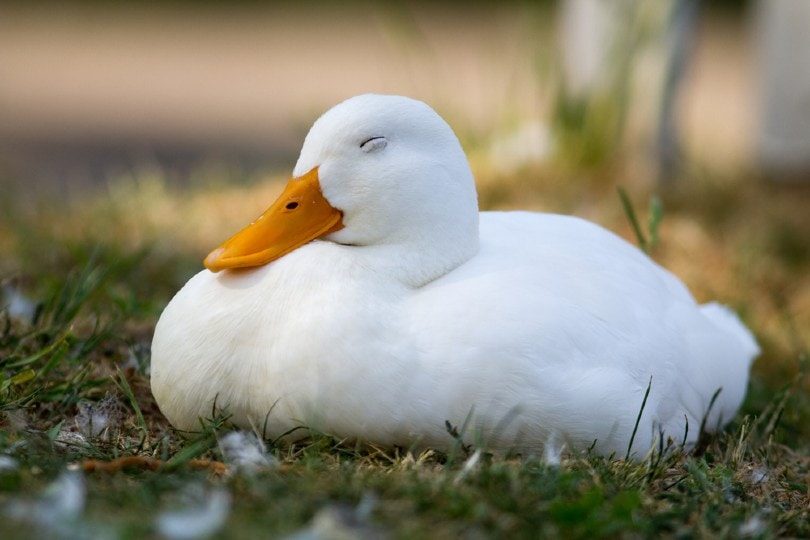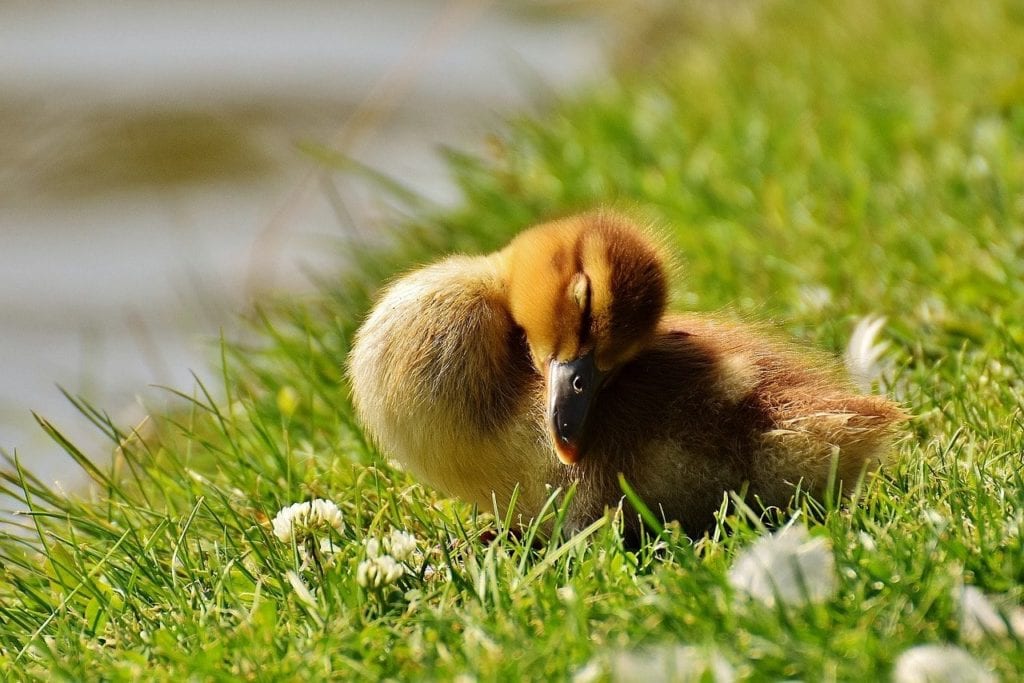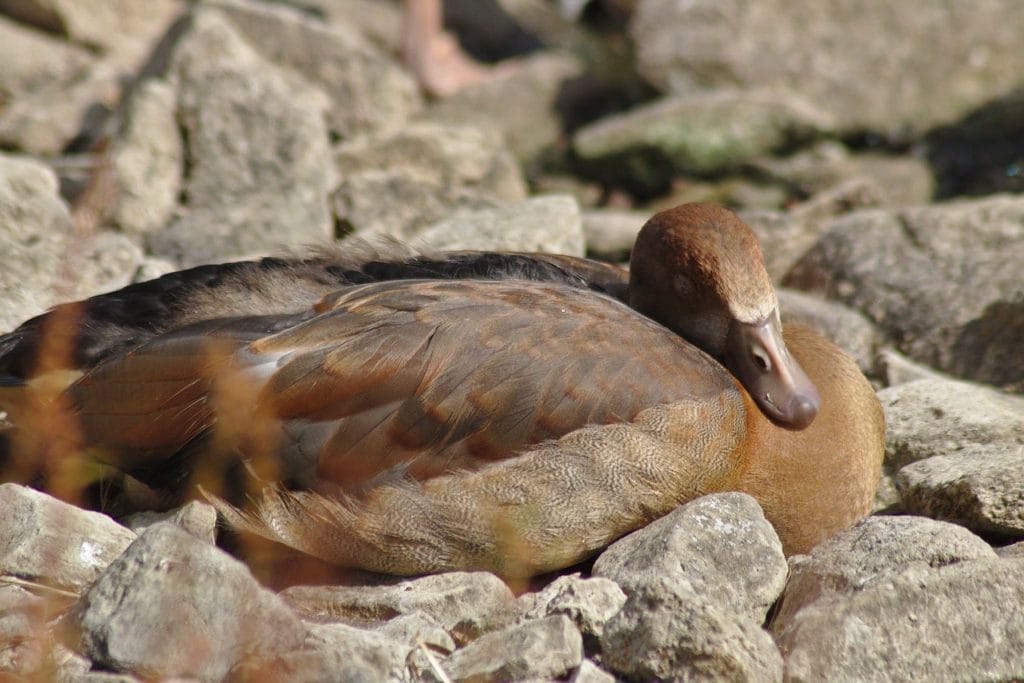Where Do Ducks Sleep? How Do They Decide?
Last Updated on

Here is a great question to ask at your next trivia night: Where do ducks sleep? Since ducks are birds, many people think ducks would sleep in nests like their very distant winged family members. But have you ever seen a duck nest in a tree? The question remains unanswered: where do ducks sleep?
The short answer to the question is lots of places. Ducks are flexible sleepers. They can sleep on land and water. Ducks sleep where they can as long as they feel safe. In this article, you will learn more about where ducks sleep and other interesting ducks sleeping habits to have you armed for your next trivia night.

Where Do Ducks Like To Sleep?
Since ducks are flexible sleepers, they will choose their sleeping places based on two factors: weather conditions and predator risk. Ducks love to take naps in the warm sunshine near the lake. However, if the weather is colder, ducks will seek a sheltered place on land to sleep for the night, like under some fallen trees or a small cave.
A sleeping duck can become an easy meal for a predator, so ducks will find places to sleep that have a low predator risk as well. If the weather is warm, sleeping on a lake or pond offers a lot of protection. If a predator enters the water to snatch a member of the raft of ducks, the water ripples will wake up everyone, and they can fly to safety. Ducks that sleep on land will find places harder for predators to access. If the predator does try to approach the ducks, the rustling of leaves or branches acts as an alarm.

Other Ways Ducks Stay Safe As They Sleep
Choosing safe places to sleep is only one way that ducks protect themselves at night.
- Sleeping in groups adds protection. There is safety in numbers, and ducks know this. Ducks will sleep in groups called a raft or paddling. Sleeping in a group also helps them stay warm during colder nights.
- They are unihemispheric. What does it mean to be unihemispheric? Unihemispheric sleepingis when an animal sleeps with only half of its brain active. Ducks are professionals at unihemispheric sleeping! This allows ducks to get rest but be a bit alert for predators. This is another reason why ducks nap during the day.
- Ducks can sleep with one eye open.In 1999, a study showed that ducks and other animals actually sleep with one eye open when they are in a unihemispheric state. Keeping one eye open allows them to be more aware of nocturnal predators.
- They change sleeping positions. Ducks that sleep in a unihemispheric state never get fully rested. This is why ducks change positions while they sleep. Guard ducks position themselves at the end of the row of sleeping ducks and sleep in a unihemispheric state. This allows the ducks in the middle to shut down both hemispheres of their brain to get better sleep.
How Often Do Ducks Sleep?
Ducks are semi-nocturnal. They will wake up during the night looking for a midnight snack or travel. Ducks also love to nap. It is common to see ducks rest on logs or rocks during the day. Who doesn’t love to take a power nap in the warm sunshine?

Do Ducks Get Cold When They Sleep?
Like many bird species, most wild ducks fly to warmer places during the winter months because the weather makes it much harder for ducks to find food. However, ducks are sturdy and can withstand temperatures as low as 20 degrees Fahrenheit, although that can increase the chance of getting frostbite on their feet. Often, when you see a duck sleeping on one leg, they are trying to conserve body heat. Less energy is lost if only one leg is exposed.
Ducks’ bodies are also built to withstand the cold for periods of time. Have you ever heard of the idiom “like water off a duck’s back”? There is truth in that phrase! Ducks and other aquatic birds have a gland near their rumps that produces preen oil. When ducks preen themselves, they are helping to spread this oil all over their feathers, making the feathers waterproof. Their feathers help keep snow and cold water from reaching their skin. They also have a layer of fat and feathers that protects them from the elements.
What About Ducks On a Farm?
Domesticated ducks only need a few things to sleep comfortably at night. Unlike chickens, ducks do not need nesting boxes but will be content to make their own nests out of hay or straw in the corner of the coop. However, domesticated ducks need to be locked in a secure pen at night for their protection.

In Conclusion
Ducks are very resilient animals. Instinct provides them with the capability of protecting themselves as they sleep. If you see ducks at a park or near a lake sleeping outside on a chilly evening, resist the urge to try and “help” them. People have good intentions when they want to help an animal. But wild animals are sturdier than most people think. Ducks have evolved to handle varying climates and threats to predators. They are really amazing creatures!
Featured Image Credit: janko.knops, Shutterstock
About the Author Robert Sparks
Robert’s obsession with all things optical started early in life, when his optician father would bring home prototypes for Robert to play with. Nowadays, Robert is dedicated to helping others find the right optics for their needs. His hobbies include astronomy, astrophysics, and model building. Originally from Newark, NJ, he resides in Santa Fe, New Mexico, where the nighttime skies are filled with glittering stars.
Related Articles:
How to Clean a Refractor Telescope: Step-by-Step Guide
How to Clean a Telescope Eyepiece: Step-by-Step Guide
How to Clean a Rifle Scope: 8 Expert Tips
Monocular vs Telescope: Differences Explained (With Pictures)
What Is a Monocular Used For? 8 Common Functions
How to Clean a Telescope Mirror: 8 Expert Tips
Brightfield vs Phase Contrast Microscopy: The Differences Explained
SkyCamHD Drone Review: Pros, Cons, FAQ, & Verdict
